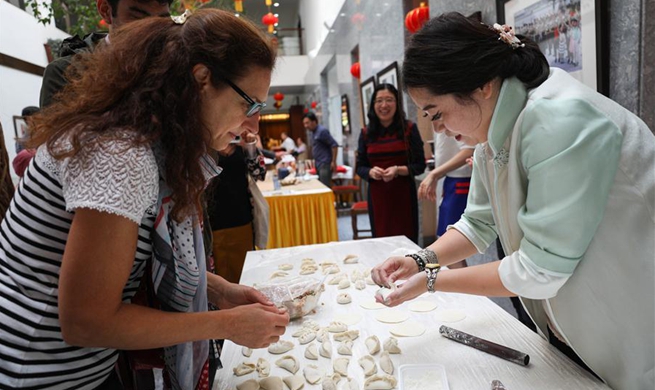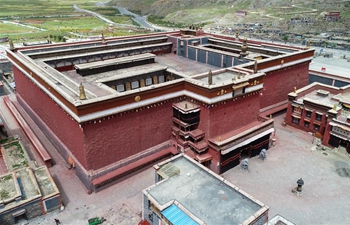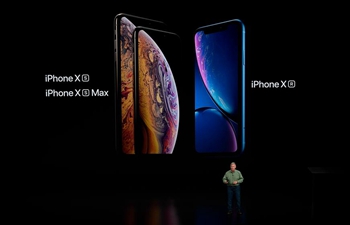by Mahmoud Fouly
CAIRO, Sept. 16 (Xinhua) -- The recent and recurrent decisions made by the administration of U.S. President Donald Trump against the Palestinians and in favor of Israel have proved that Washington's mediating role as a peacemaker in the Israeli-Palestinian conflict has gone, said Egyptian political experts.
In late August, the United States decided to stop funding the UN Relief and Works Agency for Palestine Refugees (UNRWA). A few days later, it announced shutting down the office of the Palestine Liberation Organization (PLO) in Washington.
According to some experts, Washington has never been a fair mediator in the major Middle East conflict but it only orchestrates it in a way that achieves Israeli interests.
PEACE PROCESS "MYTH"
Going on for decades now, the Palestinian-Israeli conflict erupted following the Israeli occupation of Palestinian territories and the Western-backed creation of Israel in 1948.
Peace talks between the two sides have been frozen since 2014 due to Israel's settlement expansion policy, which is met by regional and international rejection.
"It is not a peace process in the first place. It is just U.S. pressures ... in favor of Israel," said Mohamed Gomaa, researcher at the Arab and Regional Unit of Cairo-based Al-Ahram Center for Political and Strategic Studies.
He cited that Israel desires, through Trump's unlimited support, to put an end to outstanding issues such as the situation of the disputable holy city of Jerusalem, the Palestinian refugees, the Israeli settlement expansion, the issue of state identity and others.
In December last year, the United States vetoed a UN draft resolution that aims to protect the status of Jerusalem, and halt Trump's decision to recognize Jerusalem as Israel's capital and to move the U.S. embassy in Israel from Tel Aviv to Jerusalem despite regional and international outcry.
Although vetoed and blocked by Washington and the embassy was later relocated, the draft resolution was backed by all 14 other members of the UN Security Council, indicating Washington's isolationist position on the Mideast chronic conflict.
"At this stage, there is no real peace process going on for the conflict nor are there expected negotiations in the near future to talk about a U.S. role," Gomaa said. "The United States sees the conflict with Israeli eyes."
The term "deal of the century" has recently rose as a reportedly Trump-proposed settlement for the Israeli-Palestinian conflict by settling Palestinians outside their occupied territories and dropping their refugees' right of return, which is strongly rejected by the Palestinians.
"I believe that the United States knows beforehand that the Palestinians will not approve the so-called deal of the century. So, it will not announce the deal publically, but will work on achieving its goals on the ground," the expert told Xinhua.
CONFLICT NOT SETTLED
"I'm looking at the two-state and one-state, and I like the one that both parties like," Trump said in a joint press conference with Israeli Prime Minister Benjamin Netanyahu a month after he stepped in the Oval Office in early 2017.
The Palestinians pin hope on the UN-proposed two-state solution for the future establishment of their own independent state with East Jerusalem as its capital based on the pre-1967 borders.
Trump thus made it clear from the very beginning that his administration would not pressure Israel for the two-state solution and would rather take the conflict to a different direction in line with Israeli interests.
"The United States has turned the so-called peace process into a matter of procedures where the conflict is administered rather than settled," said Hassan Nafaa, a political science professor at Cairo University.
"Washington is completely biased to Israel and it attempts to use its weight to run the conflict in the way that achieves Israeli interests," the professor told Xinhua, adding that none of the U.S. and Israeli proposals can be accepted by any Palestinian.
The moves made by Trump over the past few months regarding the Israeli-Palestinian crisis were fast and frequent, using the ongoing international anti-terror war and the disunity of the Arab world to achieve Washington's vision for a settlement.
"There is terrorism in the region for real, but the United States did not have real interests to fight terrorism but employed it to serve its regional projects and interests," Nafaa said.
The Arabs, to illustrate, hold different positions on the priorities, the basic sources of threats and the map of alliances in the region, which has created a sort of convenient environment for Washington's vision on the Middle East.
The professor believed the disunity and division of the Arab world and the various conflicts in several Arab states represent one of the biggest regional weaknesses that paved the way for U.S. recurrent pro-Israel moves.

















